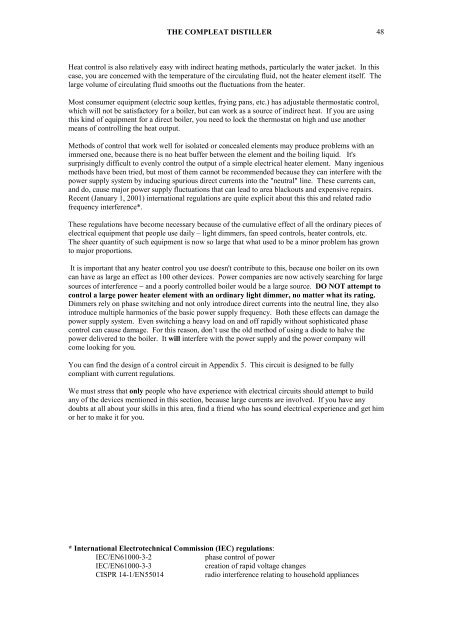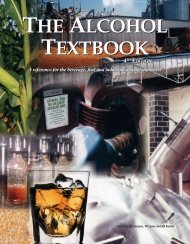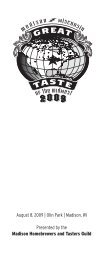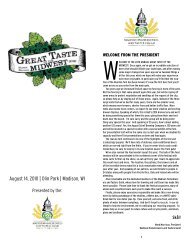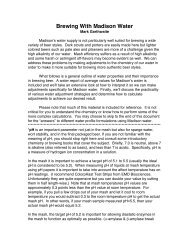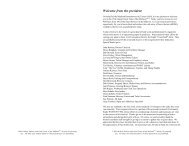The Compleat Distiller
The Compleat Distiller
The Compleat Distiller
You also want an ePaper? Increase the reach of your titles
YUMPU automatically turns print PDFs into web optimized ePapers that Google loves.
THE COMPLEAT DISTILLER 48<br />
Heat control is also relatively easy with indirect heating methods, particularly the water jacket. In this<br />
case, you are concerned with the temperature of the circulating fluid, not the heater element itself. <strong>The</strong><br />
large volume of circulating fluid smooths out the fluctuations from the heater.<br />
Most consumer equipment (electric soup kettles, frying pans, etc.) has adjustable thermostatic control,<br />
which will not be satisfactory for a boiler, but can work as a source of indirect heat. If you are using<br />
this kind of equipment for a direct boiler, you need to lock the thermostat on high and use another<br />
means of controlling the heat output.<br />
Methods of control that work well for isolated or concealed elements may produce problems with an<br />
immersed one, because there is no heat buffer between the element and the boiling liquid. It's<br />
surprisingly difficult to evenly control the output of a simple electrical heater element. Many ingenious<br />
methods have been tried, but most of them cannot be recommended because they can interfere with the<br />
power supply system by inducing spurious direct currents into the "neutral" line. <strong>The</strong>se currents can,<br />
and do, cause major power supply fluctuations that can lead to area blackouts and expensive repairs.<br />
Recent (January 1, 2001) international regulations are quite explicit about this this and related radio<br />
frequency interference*.<br />
<strong>The</strong>se regulations have become necessary because of the cumulative effect of all the ordinary pieces of<br />
electrical equipment that people use daily – light dimmers, fan speed controls, heater controls, etc.<br />
<strong>The</strong> sheer quantity of such equipment is now so large that what used to be a minor problem has grown<br />
to major proportions.<br />
It is important that any heater control you use doesn't contribute to this, because one boiler on its own<br />
can have as large an effect as 100 other devices. Power companies are now actively searching for large<br />
sources of interference − and a poorly controlled boiler would be a large source. DO NOT attempt to<br />
control a large power heater element with an ordinary light dimmer, no matter what its rating.<br />
Dimmers rely on phase switching and not only introduce direct currents into the neutral line, they also<br />
introduce multiple harmonics of the basic power supply frequency. Both these effects can damage the<br />
power supply system. Even switching a heavy load on and off rapidly without sophisticated phase<br />
control can cause damage. For this reason, don’t use the old method of using a diode to halve the<br />
power delivered to the boiler. It will interfere with the power supply and the power company will<br />
come looking for you.<br />
You can find the design of a control circuit in Appendix 5. This circuit is designed to be fully<br />
compliant with current regulations.<br />
We must stress that only people who have experience with electrical circuits should attempt to build<br />
any of the devices mentioned in this section, because large currents are involved. If you have any<br />
doubts at all about your skills in this area, find a friend who has sound electrical experience and get him<br />
or her to make it for you.<br />
* International Electrotechnical Commission (IEC) regulations:<br />
IEC/EN61000-3-2<br />
phase control of power<br />
IEC/EN61000-3-3<br />
creation of rapid voltage changes<br />
CISPR 14-1/EN55014<br />
radio interference relating to household appliances


